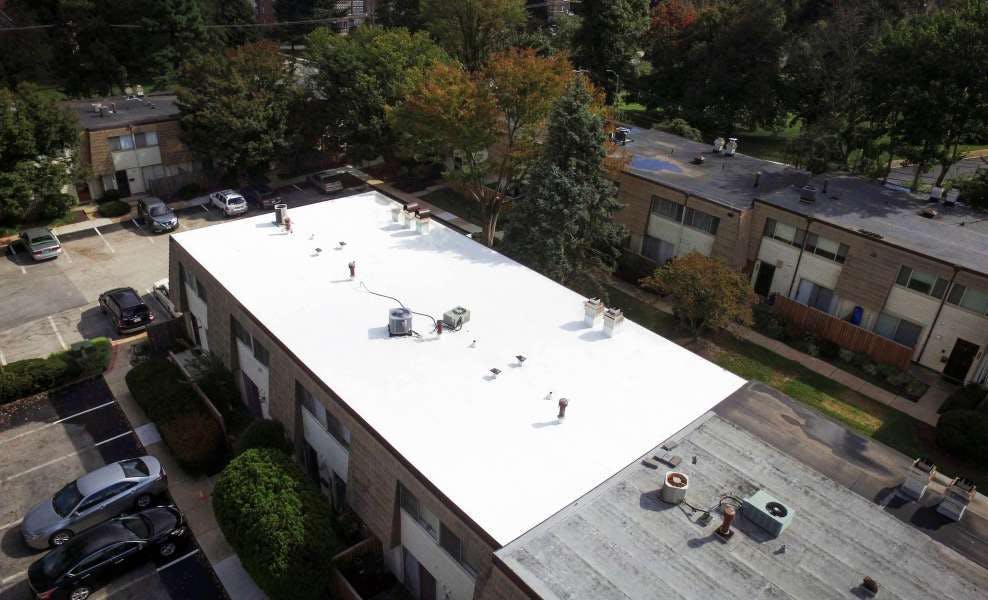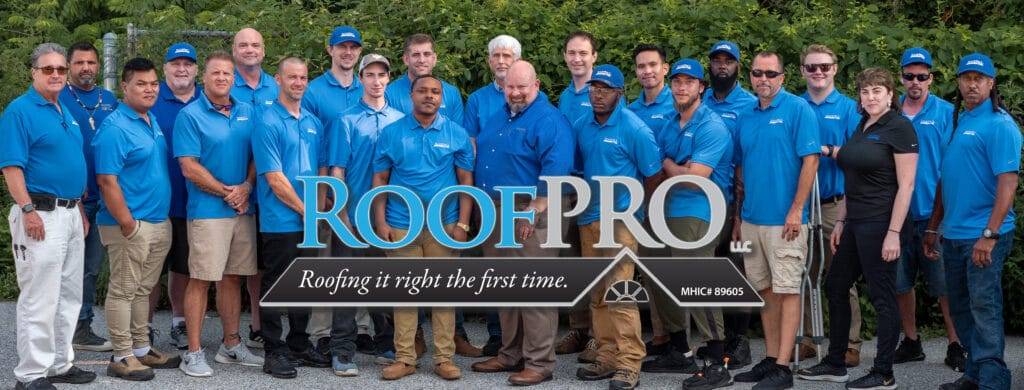Built-up roofing, commonly called BUR, is a versatile and durable system used on commercial buildings for over a century. BUR roofing systems comprise alternating layers of waterproof materials like asphalt, tar, or adhesive, along with reinforcing fabrics like felt or fiberglass mats. The multiple layers work together to form a monolithic, water-tight barrier that protects the building from water infiltration. BUR is valued for its longevity, fire resistance, and energy efficiency. A built-up roof is especially effective for low-slope commercial buildings because its layered design creates long-lasting waterproof protection. While built-up roofs require professional installation, they can last 30+ years or more with proper maintenance! Read on or contact our team at RoofPRO to learn more.
What are Built-Up Roof Systems?
Built-up roofing systems are composed of overlapping waterproof membranes that are fused together. This roofing system relies on multiple layers of reinforced membranes to deliver superior durability and long-term waterproofing. Traditional BUR utilizes hot asphalt or coal tar pitch as the waterproofing adhesive between layers; the asphalt or tar is heated to a liquid state and mopped between each layer as it is unrolled. The hot asphalt glues the layers together as it cools and cures. Modern BUR systems may utilize alternate adhesives like cold-applied glues or heat-activated adhesives that do not require hot asphalt kettles during installation.
BUR is a Common Choice for Business Owners
BUR is one of the most prevalent roofing systems in commercial buildings and industrial facilities – over 70% of low-slope commercial roofs in the United States are estimated to be built-up roofing! BUR’s dominance in the commercial roofing market is attributed to its high durability, fire resistance, and relatively low cost compared to other commercial roofing options. Business owners often prefer BUR systems for the long-term protection and peace of mind they provide!
What are Commercial BUR Roofs Made Of?
Built-up roofs consist of four essential components: a roof deck, insulation, multiple layers of roofing felt, and waterproof bitumen (asphalt or tar). The layers that make up a BUR system include the following:
• Roof Deck: This provides the foundation for the roof system. The deck is commonly made of wood, concrete, or metal.
• Insulation: Rigid insulation boards or lightweight concrete help improve the roof’s thermal efficiency.
• Roofing Felt: Fiberglass mats or organic felt are the reinforcing layers between bitumen applications. Three or more plies are used.
• Bitumen: This refers to the asphalt or tar adhesive used to waterproof and bind the layers together. Plasticizer additives can improve its flexibility.
• Surfacing: To protect the bitumen from UV rays, additional layers of gravel, aggregate, minerals, or specialized coatings may be applied.
The roofing materials work together to form a fire-resistant, moisture-tight barrier that is able to withstand ponding water, ultraviolet radiation, temperature swings, and rooftop traffic.

What are the Benefits of Built-Up Roofing Installation?
Built-up roofing (BUR) has been the go-to commercial roofing solution for over 100 years and remains a highly popular choice today. There are good reasons this time-tested system is still frequently selected for commercial buildings and industrial facilities. BUR roofing systems offer significant benefits, making it an attractive option for building owners, facility managers, architects, and contractors.
Durability and Longevity
Built-up roofs can last 20-30+ years with proper installation and maintenance. The waterproofing layers create a well-functioning roof system – if one layer is compromised, others can still provide protection in its place. BUR systems often face heavy rooftop traffic, temperature extremes, ponding water, and other challenges. Owners can get decades of reliable performance from an adequately installed built-up roof!
Energy Efficiency for Your Building
Modern BUR roofing systems include layers of insulation that provide excellent thermal performance for your commercial building. Compared to installing just a waterproof roof layer, gravel BUR helps reduce heating and cooling costs throughout the year. White reflective roofs and additional insulation layers can further improve energy efficiency.
Low Maintenance Over Time
Built-up roofs require less maintenance than many other flat roofing types. Once installed, the redundant layers protect the roof from weather and foot traffic without much intervention. Generally, a BUR commercial roof only requires annual inspections and minor repairs until a major re-roof is needed decades later. Low maintenance means more time and costs saved over the roof’s service life.
Are There Drawbacks to BUR?
While built-up roofing has numerous benefits that make it a popular choice for commercial buildings, there are some potential downsides to consider before choosing BUR. No roofing system is perfect for every application; awareness of the possible disadvantages of built-up roofing allows building owners to make an informed decision and plan accordingly. Carefully evaluating the cons and pros helps set realistic expectations for the roof’s performance. Some key drawbacks to consider when considering a new BUR roof include the following.

Weight of the Roofing System
The multiple layers in BUR add considerable weight to the roof structure. Heavier roofs require a more substantial, well-engineered deck and frame to support the load. Retrofitting existing buildings may require reinforcing the structure before a BUR roof can be installed!
All Roofing Systems Wear Down Over Time
Built-up roofing systems are known for their durability and multi-layered protection. However, like any roofing system, they aren’t immune to wear and tear. Common issues include cracks in the asphalt layers, blistering from trapped moisture, and damage to the gravel surface caused by foot traffic or weather. Repairing a BUR roof typically involves identifying problem areas, removing damaged sections, and applying new asphalt and reinforcing materials to restore the layers. If your BUR roof is showing signs of trouble, addressing flat roof repairs promptly can extend its lifespan and maintain its performance.
BUR Requires a Complex Installation Process
Proper installation by an experienced commercial roofing contractor is crucial to achieving longevity. Minor defects in waterproofing can lead to leaks and failure. The hot asphalt process also can create fire and fume hazards, requiring special safety precautions.
How Much Does a New Built-Up Roofing System Cost?
BUR costs between $4 and $12 per square foot, depending on the roof’s size, access, materials used, roof slope, location, and other factors. While inexpensive compared to some materials, the labor-intensive process makes BUR roofing expensive. Building owners should expect to make a major investment for a new commercial BUR roofing system installation.
RoofPRO is a Trusted Name for Commercial Roofing in Maryland
For nearly 20 years, RoofPRO has served as the trusted expert roofing contractor for businesses throughout Maryland. Our experienced crews have installed thousands of built-up roofing systems on commercial buildings, warehouses, factories, apartment complexes, and more.
Top-Rated Solutions for Business Owners Since 2004
Since 2004, RoofPRO has offered high-quality roofing solutions for business owners, including:
- Flat roofing services for all types of commercial and residential flat roofs
- Professional BUR installations and replacements
- Tapered insulation systems & superior drainage
- White reflective roof coatings
- Roof repairs, maintenance & 24/7 emergency service
- Industry-leading warranties
Our expertise in built-up roofing allows us to identify issues, make repairs, and suggest solutions to extend the life of your existing roof. Clients appreciate our honest, straightforward approach and dedication to solving problems permanently!

Residential and Commercial Roofing Expertise
In addition to built-up and commercial roofing, RoofPRO offers roof replacements, new construction, storm repairs, and maintenance for homeowners throughout the region! Check out our past projects gallery here.
Contact Us Today for a Free Inspection and Estimate
Don’t wait until small leaks turn into major roofing headaches. RoofPRO offers free estimates and roof analysis for business owners in Maryland. Our honest assessments help clients plan their roofing budgets wisely. We provide detailed estimates, contractor licensing, and full service from tear-off to new roof installation. Contact RoofPRO’s team today to discuss maintaining or replacing your critical commercial roofing system.
Other Types of Flat Roofing Materials
Flat roofing systems come in various types, each designed to suit specific needs and budgets. Aside from Built-Up Roofing (BUR), common options include:
EPDM (Ethylene Propylene Diene Monomer) roofing, a synthetic rubber membrane, is a popular choice for its affordability, ease of installation, and resistance to UV rays.
TPO (Thermoplastic Olefin) roofing offers energy efficiency with its reflective surface, ideal for reducing cooling costs in warmer climates.
PVC (Polyvinyl Chloride) roofing, known for its chemical resistance and longevity, is often chosen for commercial buildings where durability is key.


